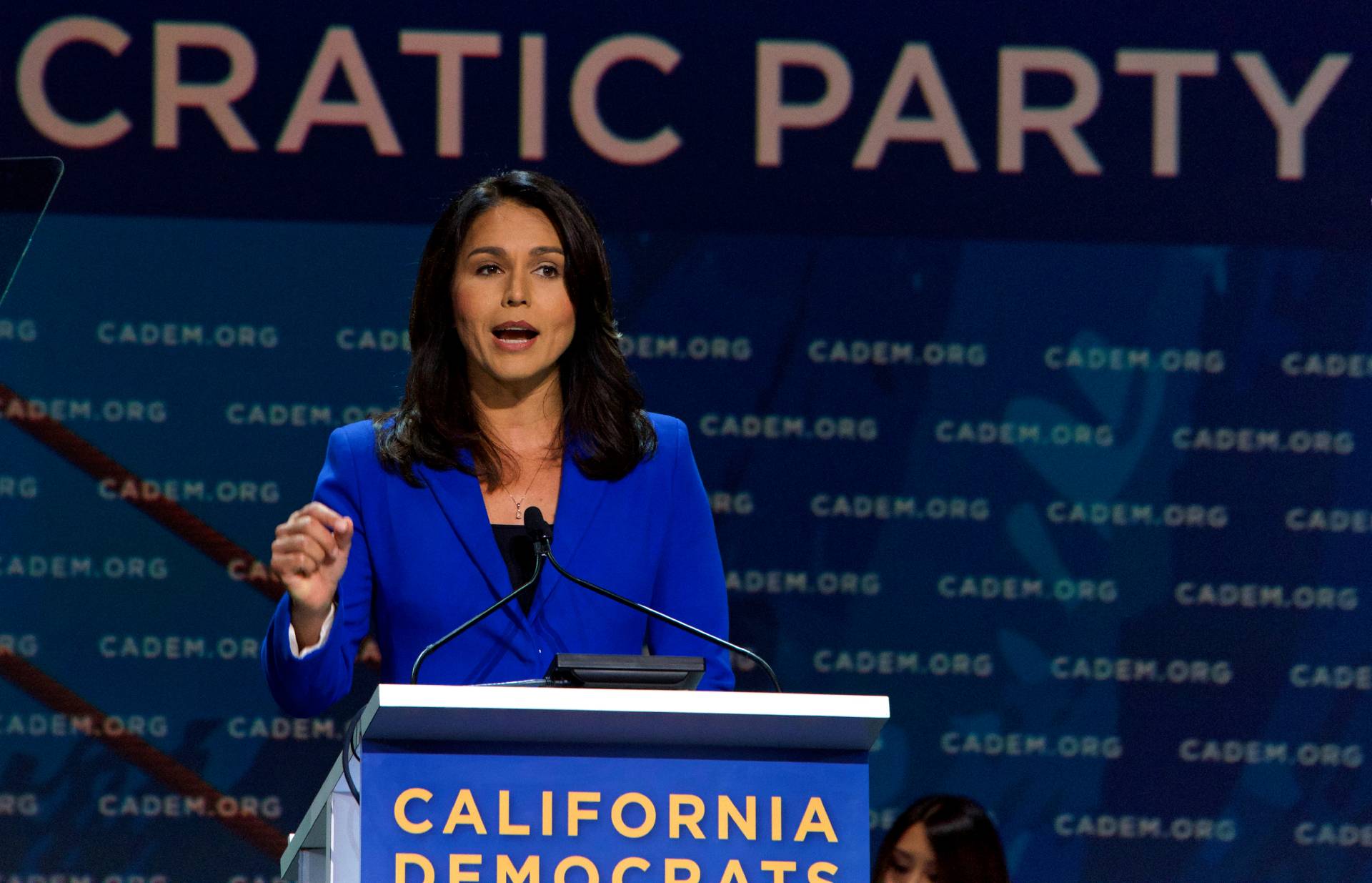The majority of media outlets in the US seem to agree, with hindsight, that the wars in the Middle East initiated by George W. Bush and prolonged by the next two presidents were launched under false pretenses and represent a waste of blood and treasure. Curiously, they also seem to believe that the US has a sacred mission impelling it always to be ready to wage war in the interest of regime change against murderous dictators. Though not all murderous dictators… Mohammed bin Salman (MBS), Jair Bolsonaro and Mohammed bin Zayed being notable exceptions, along with a few others from less important states.
The corporate media also seem to agree that talking to bad dictators (as opposed to the good ones) is tantamount to an act of treason, whereas talking to MBS or Bolsonaro is part of any politician’s sacred duty to defend the economic interests of the United States. That explains why Tulsi Gabbard, the one Democratic candidate for the presidency who, two and a half years ago, had a conversation with Syria’s Bashar al-Assad, deserves to be constantly excoriated by mainstream journalists for that meeting. Congressman Gabbard also happens to know the Middle East better than practically any politician in Washington because of her two years of military service on the battlefields of a war that the media now recognize as unjustified.
In 2002 and 2003, The New York Times was among the most vocal supporters of the invasion of Iraq and an important vector of the Bush administration’s well-orchestrated concert of lies. So, in a sense, The Times is being consistent today in its campaign to disparage the one candidate who articulately deconstructs the twisted logic of imperial war for regime change.
In a feature article on Gabbard, The NYT echoes all the other corporate media as its author, Nellie Bowles, harps on the two standard complaints Democratic “liberals” have been making about Gabbard for over two years: that she met with President Assad (the devil incarnate) and that a number of right-wing personalities (devils in their own right) have been heard to said nice things about Gabbard. That alone must be proof that she isn’t a true Democrat.
Bowles does her own diabolical damnedest to insinuate that only people on the extreme fringes, right and left, support Gabbard when she writes: “On the far left, her supporters appreciate how she talks about respecting Native cultures. On the right, as liberal democracies see authoritarian strongmen rise, Ms. Gabbard’s allies like that she would not meddle with dictators.”
Here is today’s 3D definition:
Meddle:
A multivalent verb for political journalists at The New York Times. It can signify two opposing notions depending on who is doing the meddling. In the example, “Russia meddled with US elections,” it means that Russia illegally interfered with the elections. But when the US accepts to “meddle with dictators,” it means that the US is exercising its right and moral duty to use any means, including military intervention, to ensure that dictators will either conform to policies agreeable to the United States or be removed from office.
Contextual Note
The language of the article clearly reveals its bias against Gabbard. Just like other journalists and interviewers — whether it’s Chris Cuomo of CNN or the late-night TV host Stephen Colbert — rather than processing the congresswoman’s logic about why it might be of interest to develop a dialogue with the leaders in the world’s hot spots, the author uses innuendo to create suspicion. Bowles repeats the major reproach every journalist has been coming back to after two and a half years when she describes “what seemed to be a friendly meeting with Bashar al-Assad.”
What can she possibly mean by “seemed?” The insidious suggestion is that because it “seemed” friendly, Gabbard and Assad may in fact be friends. Bowles follows this up with this: “More recently, she said Mr. Assad was ‘not the enemy of the United States,’” knowing that most Americans mistakenly think Assad is a declared enemy (he isn’t). Gabbard is technically and diplomatically right; Bowles is journalistically wrong.
In an act of generous sympathy, Bowles admits that veterans may have a harsher view of war than civilians. But she adds, “Her [Gabbard’s] line is just a lot further out there” than that of the veterans. What she wants her readers to think is that Gabbard is an unrealistic radical. What she should have said is that Gabbard’s understanding and intellect go beyond the visceral, unreflective reactions of most veterans, many of whom have been traumatized by their war experience. “Her line” implies that Gabbard is spouting an ideology rather than relating a deeply reasoned and morally elaborated reaction to a lived reality. With “further out there,” Bowles seeks to brand Gabbard as an extremist.
Historical Note
Bowles then goes on to evoke the peace movements of the past, without appearing to be aware of their history: “The Democratic Party and the progressive movement have always had their share of peaceniks. But even those who opposed military intervention still argued for the promotion of human rights abroad. Ms. Gabbard is different.” She wants us to believe that those who warn against the folly of war should be derogatorily termed “peaceniks” and that the slaughter and disruption of America’s recent wars are somehow the inevitable and totally acceptable result of “the promotion of human rights.” That is truly what may be called “a line,” but alas one that is “further in there.”
The journalist does have the decency to quote Gabbard: “This is a decision and a choice and a process that people in other countries have to make for themselves.” This concession to Gabbard’s logic is immediately followed, with no transition, by a new paragraph in the form of a brutal single sentence: “Ms. Gabbard’s coalition is a motley crew.”
Bowles mendaciously suggests Gabbard has put together a “coalition” of like-minded thinkers, citing Republican libertarian Ron Paul and right-wing firebrand Ann Coulter. This serves to create the absurd impression that Gabbard recruited enemies of the Democratic Party to her cause and formed something similar to Bush’s “coalition of the willing.”
And then comes a sentence that achieves the height of journalistic irresponsibility, to the point that it merits being highlighted and taught in journalism classes across the globe: “[S]ome who track Russian disinformation campaigns say they see troll activity pushing for Ms. Gabbard as well.” Fox News couldn’t have done better. “Some” = a vague group of people, who, given their declared interest in Russian hacking, are more likely than not to be conspiracy theorists. But the “some” is compounded by “say.” “Some … say” = partisan backbiting at best, unfounded hearsay at worst and dishonest journalism in both cases. As for “troll activity,” what cause or candidate in the age of social media isn’t the object of troll activity? Trolls are everywhere. It’s the nature of the medium.
Then we get an astounding explanation from a “former FBI agent” who made this claim (in an ungrammatical sentence): “Tracking metrics of Russian state propaganda on Twitter, she was by far the most favored candidate.” What metrics? And what propaganda? Clint Watts happens to be part of the military-industrial intelligence complex, not just a former FBI man. Why doesn’t Bowles mention that?
Among the Democratic “peaceniks” of the past, Bowles might have mentioned Senator William Fulbright, a political and historical heavyweight who contested President Lyndon Johnson’s war in Vietnam and whose words constitute the most cogent defense of Gabbard’s meeting with Assad: “The rapprochement of peoples is only possible when differences of culture and outlook are respected and appreciated rather than feared or condemned, when the common bond of human dignity is recognized as the essential bond for a peaceful world.” That can involve talking to murderous dictators, especially for a nation that has blood on its own hands.
Fulbright also said concerning the Vietnam War: “I believed what we were told about it in the committee. No one had the skepticism that is essential, I’ve since discovered. We accepted it. I had no feeling that there would be a disposition to misrepresent what actually happened.”
The New York Times continues to naively believe (or cynically repeat) that when the US government speaks, there is never a “disposition to misrepresent.” It continues to accept the unacceptable and denigrate those who oppose it. At the same time, it has no qualms about misrepresenting the position of a brave woman and presidential candidate who truly understands the cost of war.
*[In the age of Oscar Wilde and Mark Twain, another American wit, the journalist Ambrose Bierce, produced a series of satirical definitions of commonly used terms, throwing light on their hidden meanings in real discourse. Bierce eventually collected and published them as a book, The Devil’s Dictionary, in 1911. We have shamelessly appropriated his title in the interest of continuing his wholesome pedagogical effort to enlighten generations of readers of the news.]
The views expressed in this article are the author’s own and do not necessarily reflect Fair Observer’s editorial policy.
Support Fair Observer
We rely on your support for our independence, diversity and quality.
For more than 10 years, Fair Observer has been free, fair and independent. No billionaire owns us, no advertisers control us. We are a reader-supported nonprofit. Unlike many other publications, we keep our content free for readers regardless of where they live or whether they can afford to pay. We have no paywalls and no ads.
In the post-truth era of fake news, echo chambers and filter bubbles, we publish a plurality of perspectives from around the world. Anyone can publish with us, but everyone goes through a rigorous editorial process. So, you get fact-checked, well-reasoned content instead of noise.
We publish 2,500+ voices from 90+ countries. We also conduct education and training programs
on subjects ranging from digital media and journalism to writing and critical thinking. This
doesn’t come cheap. Servers, editors, trainers and web developers cost
money.
Please consider supporting us on a regular basis as a recurring donor or a
sustaining member.
Will you support FO’s journalism?
We rely on your support for our independence, diversity and quality.






